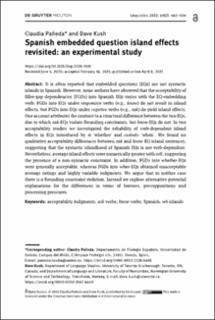Spanish embedded question island effects revisited: An experimental study
Peer reviewed, Journal article
Published version

Åpne
Permanent lenke
https://hdl.handle.net/11250/3034614Utgivelsesdato
2021Metadata
Vis full innførselSamlinger
Sammendrag
It is often reported that embedded questions (EQs) are not syntactic islands in Spanish. However, some authors have observed that the acceptability of filler-gap dependencies (FGDs) into Spanish EQs varies with the EQ-embedding verb: FGDs into EQs under responsive verbs (e.g., know) do not result in island effects, but FGDs into EQs under rogative verbs (e.g., ask) do yield island effects. One account attributes the contrast to a structural difference between the two EQs, due to which ask-EQs violate Bounding constraints, but know-EQs do not. In two acceptability studies we investigated the reliability of verb-dependent island effects in EQs introduced by si ‘whether’ and cuándo ‘when’. We found no qualitative acceptability differences between ask and know EQ-island sentences, suggesting that the syntactic islandhood of Spanish EQs is not verb-dependent. Nevertheless, average island effects were numerically greater with ask, suggesting the presence of a non-syntactic constraint. In addition, FGDs into whether-EQs were generally acceptable, whereas FGDs into when-EQs obtained unacceptable average ratings and highly variable judgments. We argue that in neither case there is a Bounding constraint violation. Instead we explore alternative potential explanations for the differences in terms of features, presuppositions and processing pressures.
